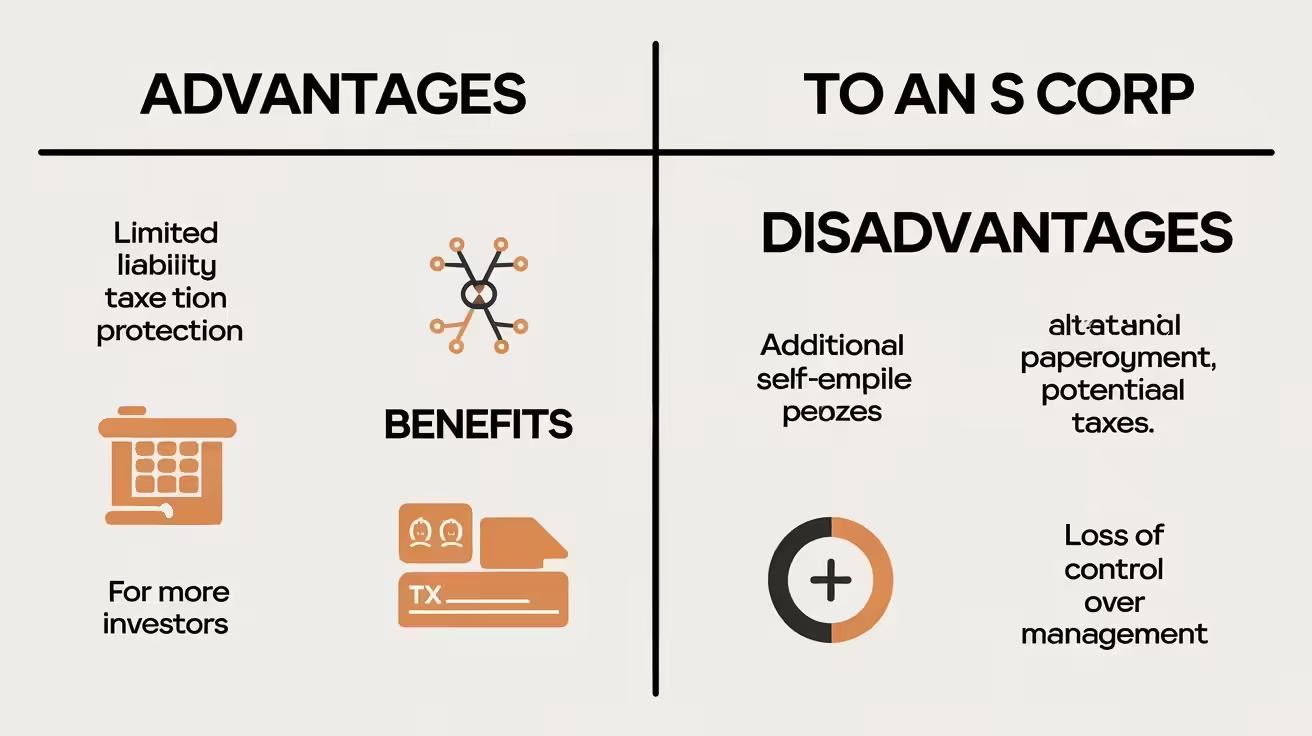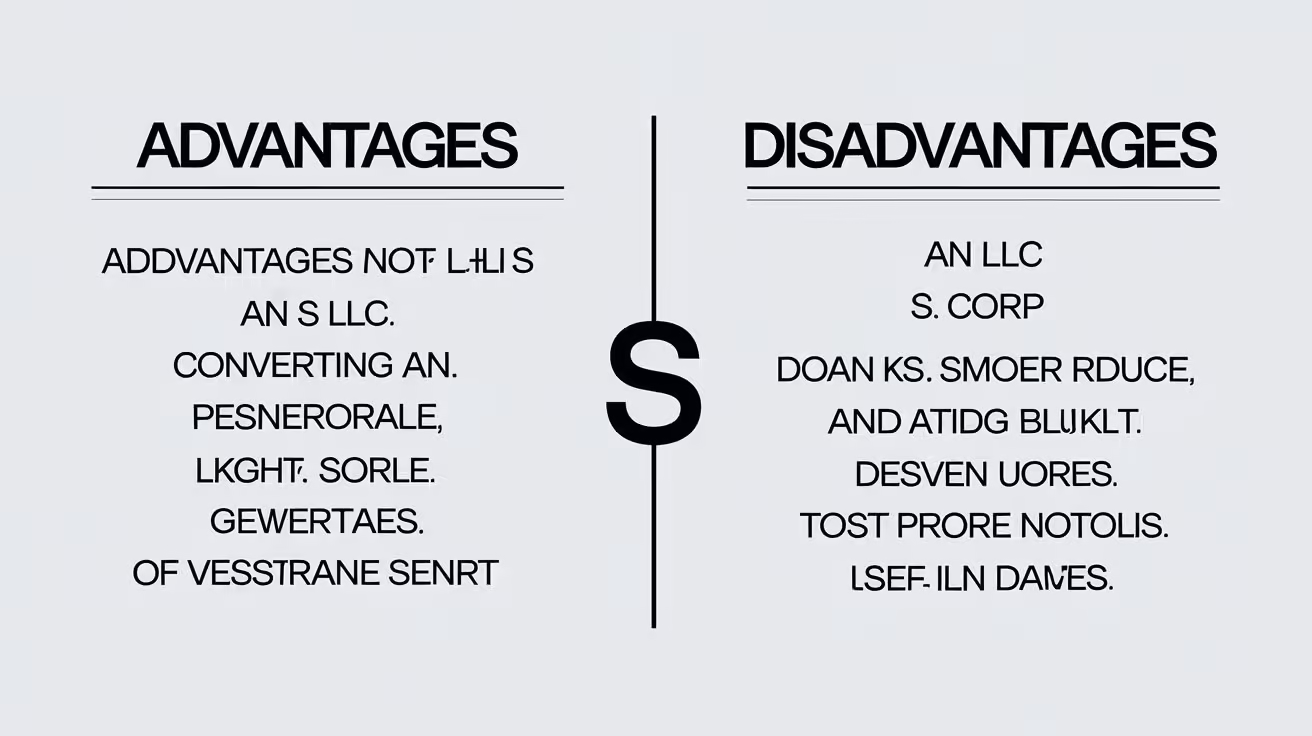Can I Convert LLC to S Corp Advantages and Disadvantages?

If you’re a business owner wondering about the right structure for your company, you may have found yourself asking, “Can I convert LLC to an S Corp? What are the advantages and disadvantages?” This is a question many entrepreneurs face as their businesses grow and evolve. Converting your LLC (Limited Liability Company) to an S Corporation can have a significant impact on how you’re taxed, how much flexibility you retain, and the overall structure of your business. This article will provide an in-depth look at the advantages and disadvantages of making such a conversion, helping you determine if it’s the right move for your business.
What Is an LLC?
An LLC, or Limited Liability Company, is a flexible and relatively easy-to-establish business structure that combines the limited liability protection of a corporation with the operational flexibility and tax efficiencies of a partnership. It’s popular among small business owners because it offers personal liability protection—your personal assets are typically shielded from business debts and lawsuits. Additionally, the owners of an LLC, known as “members,” can choose how they want to be taxed: as a sole proprietorship, partnership, C Corporation, or S Corporation.
What Is an S Corporation?
An S Corporation (S Corp) is not a type of legal entity like an LLC or corporation. Instead, it is a tax designation available to corporations and LLCs that meet specific IRS criteria. The “S” stands for “Subchapter S,” which refers to a section of the Internal Revenue Code. When you elect S Corp status, your business becomes a “pass-through” entity for tax purposes, meaning that income, losses, deductions, and credits are passed through to the owners and reported on their individual tax returns (convert llc to s corp).
Can I Convert LLC to S Corp Advantages and Disadvantages?
Yes, you can convert an LLC to an S Corp, but the decision comes with both advantages and disadvantages. Understanding these is crucial to making the right choice for your business.
Advantages of Converting an LLC to an S Corp
Converting an LLC to an S Corp offers several benefits, primarily related to taxes, but there are other advantages as well. Let’s explore the main perks.
Tax Savings on Self-Employment Taxes
One of the most significant reasons LLC owners consider converting to an S Corp is to reduce self-employment taxes. As an LLC member, you’re subject to self-employment taxes (which include Social Security and Medicare taxes) on the entire net income of the business. However, when you convert to an S Corp, only the wages you pay yourself as an employee are subject to self-employment taxes. The rest of the business profits are treated as distributions, which are not subject to self-employment taxes (convert llc to s corp).
For example, if your LLC generates $200,000 in net income, all of that amount would be subject to self-employment taxes (currently at a rate of 15.3%). But if you convert to an S Corp and pay yourself a reasonable salary of $100,000, only that salary would be subject to these taxes, potentially saving you thousands of dollars.
Pass-Through Taxation
Like LLCs, S Corps are pass-through entities, meaning that the profits and losses of the business are passed through to the owners and reported on their individual tax returns. This avoids the double taxation that can occur with C Corporations, where the business is taxed at the corporate level and then dividends are taxed again on the shareholders’ personal tax returns.
Personal Asset Protection
Both LLCs and S Corps provide limited liability protection. This means that your personal assets (such as your home, car, and personal savings) are generally protected from business debts and lawsuits. Converting your LLC to an S Corp does not reduce this protection; it continues to shield your personal assets from the liabilities of the business.

More Credibility with Investors
Some investors and lenders may perceive an S Corp as a more formal, structured business entity than an LLC. Converting to an S Corp could make it easier for you to attract investment capital or secure loans because it suggests a higher level of organization and commitment to growth.
Flexible Ownership Structure
LLCs allow for multiple classes of ownership and varying levels of participation, but S Corps have restrictions on ownership. Despite these restrictions, for businesses with relatively simple ownership structures, an S Corp can still provide flexibility in how you distribute profits and manage the company. With an S Corp, you can issue stock, which can be attractive if you’re planning to offer equity as part of a compensation package or to raise capital (convert llc to s corp).
Disadvantages of Converting an LLC to an S Corp
While converting to an S Corp offers tax advantages and other benefits, it also comes with drawbacks. It’s essential to weigh these disadvantages before deciding if the conversion makes sense for your business.
Stricter IRS Scrutiny
One of the potential disadvantages of converting your LLC to an S Corp is that the IRS tends to scrutinize S Corps more closely, especially when it comes to determining whether the salary you’re paying yourself is “reasonable.” If the IRS believes you’re underpaying yourself in an attempt to avoid self-employment taxes, you could face penalties. Therefore, it’s critical to make sure that the salary you set for yourself is fair and in line with industry standards (convert llc to s corp).
Increased Administrative Burden
Converting an LLC to an S Corp means taking on additional administrative responsibilities. For example, S Corps are required to file Form 1120S with the IRS every year, which is a more complex tax return than the one typically filed by an LLC. Additionally, if you have employees, you’ll need to handle payroll taxes and file quarterly payroll tax returns. If you don’t have experience managing these requirements, you may need to hire a bookkeeper or accountant, which adds to your expenses.
Limitations on Ownership and Stock Issuance
S Corps are subject to certain ownership restrictions. For example, S Corps cannot have more than 100 shareholders, and those shareholders must be U.S. citizens or residents. Additionally, S Corps are limited to issuing only one class of stock, which could be a drawback if you’re looking for more flexibility in how you structure ownership or raise capital (convert llc to s corp).
Reduced Flexibility in Profit Distribution
LLCs offer a great deal of flexibility when it comes to distributing profits among owners. You can divide profits in any way you choose, regardless of ownership percentages. In contrast, S Corps are required to distribute profits according to ownership percentages. This means you lose some of the flexibility that you had with an LLC when it comes to splitting up profits (convert llc to s corp).
Higher Compliance Costs
Due to the increased administrative requirements of operating an S Corp, you may face higher compliance costs. In addition to filing more complex tax returns, you’ll need to hold regular shareholder meetings, keep meeting minutes, and comply with other corporate formalities. These added responsibilities could increase the time and money you spend on ensuring your business stays compliant with both federal and state regulations.
Steps to Convert an LLC to an S Corp
Now that we’ve explored the advantages and disadvantages of converting an LLC to an S Corp, you may be wondering how the conversion process works. Here’s a step-by-step guide to help you understand the key steps involved (convert llc to s corp).
1. Ensure Eligibility for S Corp Status
Before converting your LLC to an S Corp, you must make sure that your business is eligible. According to IRS rules, an S Corp cannot have more than 100 shareholders, all shareholders must be U.S. citizens or residents, and the business can only issue one class of stock.
2. File IRS Form 2553
To officially elect S Corp status, you’ll need to file IRS Form 2553, Election by a Small Business Corporation. This form must be submitted by March 15 of the tax year in which you want the election to take effect. It’s essential to complete this form accurately and on time to avoid delays or penalties (convert llc to s corp).
3. Amend Your LLC’s Operating Agreement
Once you’ve elected S Corp status, you’ll likely need to amend your LLC’s operating agreement to reflect the new ownership and management structure required by S Corp rules. You may also need to update your business’s articles of organization or other formation documents to ensure they align with your new tax designation.
4. Update Payroll and Tax Withholding
As an S Corp, you’ll need to start paying yourself a reasonable salary and withholding payroll taxes. This means you’ll need to set up payroll if you haven’t already, and ensure that you’re complying with all federal and state payroll tax requirements.
5. Consult with a Tax Professional
Because converting an LLC to an S Corp involves significant tax and legal implications, it’s a good idea to consult with a tax professional or accountant before making the switch (convert llc to s corp). They can help you understand the full impact of the conversion on your business and guide you through the process to ensure a smooth transition.

Can I Convert LLC to S Corp Advantages and Disadvantages: Conclusion
Deciding whether to convert an LLC to an S Corp is a complex decision that requires careful consideration of both the advantages and disadvantages. While converting can provide significant tax savings, increased credibility, and personal asset protection, it also comes with added administrative responsibilities, potential IRS scrutiny, and limitations on ownership and profit distribution (convert llc to s corp).
Ultimately, the best choice for your business will depend on your specific circumstances, including your revenue, growth plans, and ability to manage the additional compliance requirements. Consulting with a tax professional or business advisor can help you make an informed decision that aligns with your long-term goals.
Further Understanding of Self-Employment Tax Savings
When considering converting an LLC to an S Corporation, a significant draw for many small business owners is the potential to save on self-employment taxes. While this has been touched upon earlier, it’s important to expand on how the calculation of these taxes works and why S Corp status can result in substantial savings.
In an LLC taxed as a sole proprietorship or partnership, business income flows directly through to the owners, and all net income is subject to self-employment taxes (convert llc to s corp). As mentioned earlier, this tax rate is currently 15.3%, which includes both the employer and employee portions of Social Security and Medicare taxes. For small businesses with high income, this can quickly add up, eating into profits that could otherwise be reinvested into the company or paid out to owners.
However, when an LLC elects S Corp status, the owner is required to take a “reasonable salary” for their work in the business. Only this salary is subject to payroll taxes, while any additional income distributed to the owner as profits (known as “distributions”) is not subject to self-employment taxes. This can lead to significant tax savings for businesses with substantial net income, provided that the salary paid to the owner is truly reasonable and in line with industry standards (convert llc to s corp).
For example, let’s say a business generates $250,000 in net income. Under an LLC structure, the entire $250,000 would be subject to the 15.3% self-employment tax, resulting in roughly $38,250 in taxes. By converting to an S Corp, the owner might set a reasonable salary of $100,000. In this case, only that $100,000 would be subject to payroll taxes, amounting to $15,300. The remaining $150,000 would be classified as distributions and avoid self-employment tax, leading to a potential tax savings of over $23,000. This substantial reduction is one of the primary drivers for LLC owners to consider making the switch to an S Corporation.
Reasonable Salary Requirement: A Closer Look
While the tax savings from an S Corporation can be enticing, business owners must be cautious about the reasonable salary requirement (convert llc to s corp). The IRS takes this seriously and may scrutinize S Corps that pay unreasonably low salaries to owners in an attempt to reduce their tax burden. Failing to pay yourself a fair salary can trigger an IRS audit and potentially result in penalties and back taxes. So, how do you determine what constitutes a reasonable salary?
A reasonable salary is generally defined as compensation that reflects what someone with similar qualifications, experience, and job responsibilities would earn in the open market. Factors to consider include:
- The duties you perform within the company
- The size and profitability of your business
- The industry standards for salaries in similar roles
- Geographic location and cost of living
It’s also worth noting that the salary should include both a base wage and any additional forms of compensation, such as bonuses or benefits. If you’re unsure of what a reasonable salary is, consulting industry salary reports or working with a financial advisor can help you stay compliant.
Converting LLC to S Corp Advantages and Disadvantages for Growth-Oriented Businesses
For growth-oriented businesses, converting an LLC to an S Corp can offer unique advantages that go beyond tax savings. For example, an S Corp can issue stock to shareholders, which can be an attractive option if you’re planning to bring on investors or offer equity as part of employee compensation packages. While the ownership restrictions of an S Corp are more rigid compared to an LLC, many small to mid-sized businesses find that these restrictions (such as the 100-shareholder limit and requirement that all shareholders be U.S. citizens or residents) are not a significant impediment (convert llc to s corp).
The ability to issue stock can also simplify succession planning. If you’re looking to eventually sell the business or pass it down to the next generation, having a clear ownership structure with stock issuance can make it easier to transfer ownership (convert llc to s corp).
The Impact of S Corp Status on Legal and Administrative Obligations
While S Corps and LLCs both provide liability protection for their owners, converting to an S Corp involves additional legal and administrative obligations. These requirements include:
- Annual Meetings: S Corps are required to hold regular shareholder meetings and keep detailed minutes of these meetings. While this may not seem burdensome, it adds an extra layer of formality compared to an LLC, which has fewer meeting requirements (convert llc to s corp).
- Corporate Formalities: S Corps must follow certain corporate formalities, such as adopting bylaws, issuing stock certificates, and maintaining accurate financial records. Failing to comply with these formalities could lead to the loss of the S Corp status or limited liability protections (convert llc to s corp).
- State Filing Requirements: In addition to federal filings, your state may have specific requirements for S Corps, such as filing an annual report or paying franchise taxes. These vary by state, so it’s essential to stay on top of your local regulations to avoid penalties or loss of good standing.
For smaller businesses that prefer operational simplicity, these additional requirements can be seen as a disadvantage. However, for businesses looking to grow or bring on new investors, the additional structure provided by an S Corp may be viewed as a positive factor that signals stability and professionalism (convert llc to s corp). Ltd vs LLC: Master the 5 Key Differences for Business Success
Flexibility vs. Formality: Which Structure Fits Your Business?
One of the defining features of an LLC is its flexibility. LLCs allow for a variety of ownership structures, profit-sharing arrangements, and operational setups. This flexibility can be especially beneficial for small business owners who want to retain control over how profits are distributed or how decisions are made within the company. Additionally, LLCs are less bound by rigid corporate formalities, which can reduce administrative burdens and provide more day-to-day freedom (convert llc to s corp).
In contrast, an S Corp requires more formalized structures and is limited by ownership and profit distribution rules. Profits must be distributed according to ownership percentages, and the number of shareholders is capped at 100. However, for businesses with clear-cut ownership structures and a desire to grow or attract investors, the added formality and structure of an S Corp can provide a stronger foundation for long-term success (convert llc to s corp). S Corporation vs Sole Proprietor: Master the 5 Art of Business Structure
Ultimately, deciding between the flexibility of an LLC and the formal structure of an S Corp depends on your business goals, growth plans, and administrative capacity. While LLCs offer freedom and simplicity, S Corps can provide tax advantages and a professional image that may benefit businesses looking to expand (convert llc to s corp).
For more information regarding Finance Basic you can visit FinancewithAi Channel & Home

Other Considerations: State-Level Implications and Hidden Costs
It’s also essential to consider how converting your LLC to an S Corp will affect your business at the state level. Some states impose additional taxes or fees on S Corps that may not apply to LLCs. For example, California imposes a franchise tax on S Corporations, and other states may have similar requirements. Before making the conversion, research your state’s tax policies to ensure that you won’t face unexpected costs that negate the benefits of S Corp status (convert llc to s corp).
Additionally, the conversion itself may come with one-time costs, such as legal fees to amend your operating agreement or filing fees with the state. Make sure you factor these expenses into your decision-making process.
Conclusion On Can I Convert LLC to S Corp Advantages and Disadvantages
In conclusion, the decision to convert your LLC to an S Corporation can offer substantial tax savings and a more formalized structure that may benefit growth-oriented businesses (convert llc to s corp). However, it also introduces additional administrative responsibilities, potential IRS scrutiny, and limitations on ownership. As with any major business decision, it’s crucial to carefully weigh these pros and cons in light of your specific business goals, current income, and long-term plans. Working closely with a tax advisor or legal professional can help ensure that you make the best choice for your company’s future (convert llc to s corp).
FAQs
Can I convert an LLC to an S Corp to save on taxes?
Yes, converting to an S Corp can reduce self-employment taxes by allowing you to pay yourself a salary and take the remaining profits as distributions, which are not subject to self-employment taxes (convert llc to s corp).
What are the main disadvantages of converting an LLC to an S Corp?
The disadvantages include increased administrative burden, stricter IRS scrutiny, and limitations on ownership and profit distribution (convert llc to s corp).
Do I lose my limited liability protection if I convert my LLC to an S Corp?
No, both LLCs and S Corps offer limited liability protection, so your personal assets remain protected from business debts (convert llc to s corp).
How does converting to an S Corp affect my tax filing?
As an S Corp, you’ll need to file Form 1120S annually, and if you have employees, you’ll also be responsible for filing payroll tax returns (convert llc to s corp).
What is a “reasonable salary” in an S Corp?
A reasonable salary is one that reflects what someone in your position and industry would typically earn. The IRS requires that you pay yourself a reasonable salary to avoid underpayment of self-employment taxes (convert llc to s corp).
Can I revert back to an LLC after converting to an S Corp?
Yes, it’s possible to revoke your S Corp status and return to being taxed as an LLC, but the process can be complex, so it’s essential to consult with a tax professional (convert llc to s corp).
Your blog is a testament to your dedication to your craft. Your commitment to excellence is evident in every aspect of your writing. Thank you for being such a positive influence in the online community.